9 start with E start with E
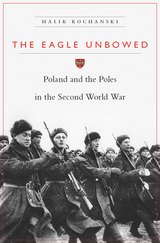
The Second World War gripped Poland as it did no other country in Europe. Invaded by both Germany and the Soviet Union, it remained under occupation by foreign armies from the first day of the war to the last. The conflict was brutal, as Polish armies battled the enemy on four different fronts. It was on Polish soil that the architects of the Final Solution assembled their most elaborate network of extermination camps, culminating in the deliberate destruction of millions of lives, including three million Polish Jews. In The Eagle Unbowed, Halik Kochanski tells, for the first time, the story of Poland's war in its entirety, a story that captures both the diversity and the depth of the lives of those who endured its horrors.
Most histories of the European war focus on the Allies' determination to liberate the continent from the fascist onslaught. Yet the "good war" looks quite different when viewed from Lodz or Krakow than from London or Washington, D.C. Poland emerged from the war trapped behind the Iron Curtain, and it would be nearly a half-century until Poland gained the freedom that its partners had secured with the defeat of Hitler. Rescuing the stories of those who died and those who vanished, those who fought and those who escaped, Kochanski deftly reconstructs the world of wartime Poland in all its complexity-from collaboration to resistance, from expulsion to exile, from Warsaw to Treblinka. The Eagle Unbowed provides in a single volume the first truly comprehensive account of one of the most harrowing periods in modern history.
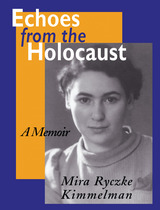
A Memoir
Mira Ryczke Kimmelman
"During the most difficult times of World War II," Mira Kimmelman writes, "I wondered whether the world really knew what was happening to us. I lived in total isolation, not knowing what was taking place outside the ghetto gates, outside the barbed wires of concentration camps. After the war, would anyone ever believe my experiences?"
Kimmelman had no way of preserving her experiences on paper while they happened, but she trained herself to remember. And now, as a survivor of the Holocaust, she has preserved her recollections for posterity in this powerful and moving book—one woman's personal perspective on a terrible moment in human history.
The daughter of a Jewish seed exporter, the author was born Mira Ryczke in 1923 in a suburb of the Baltic seaport of Danzig (now Gdansk, Poland). Her childhood was happy, and she learned to cherish her faith and heritage. Through the 1930s, Mira's family remained in the Danzig area despite a changing political climate that was compelling many friends and neighbors to leave. With the Polish capitulation to Germany in the autumn of 1939, however, Mira and her family were forced from their home. In calm, straightforward prose—which makes her story all the more harrowing—Kimmelman recalls the horrors that befell her and those she loved. Sent to Auschwitz in 1944, she escaped the gas chambers by being selected for slave labor. Finally, as the tide of war turned against Germany, Mira was among those transported to Bergen-Belsen, where tens of thousands were dying from starvation, disease, and exposure. In April 1945, British troops liberated the camp, and Mira was eventually reunited with her father. Most of the other members of her family had perished.
In the closing chapters, Kimmelman describes her marriage, her subsequent life in the United States, and her visits to Israel and to the places in Europe where the events of her youth transpired. Even when confronted with the worst in humankind, she observes, she never lost hope or succumbed to despair. She concludes with an eloquent reminder: "If future generations fail to protect the truth, it vanishes. . . . Only by remembering the bitter lesson of Hitler’s legacy can we hope it will never be repeated. Teach it, tell it, read it."
The Author: Mira Ryczke Kimmelman is a resident of Oak Ridge, Tennessee, and lectures widely in schools about her experiences during the Holocaust.
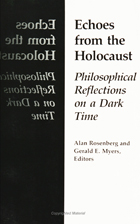
The murder of six million Jewish men, women, and children during World War II was an act of such barbarity as to constitute one of the central events of our time; yet a list of the major concerns of professional philosophers since 1945 would exclude the Holocaust. This collection of twenty-three essays, most of which were written expressly for this volume, is the first book to focus comprehensively on the profound issues and philosophical significance of the Holocaust.
The essays, written for general as well as professional readers, convey an extraordinary range of factual information and philosophical reflection in seeking to identify the haunting meanings of the Holocaust. Among the questions addressed are: How should philosophy approach the Holocaust? What part did the philosophical climate play in allowing Hitlerism its temporary triumph? What is the philosophical climate today and what are its probable cultural effects? Can philosophy help our culture to become a bulwark against future agents of evil? The multiple dimensions of the Holocaust—historical, sociological, psychological, religious, moral, and literary—are collected here for concentrated philosophical interpretations.
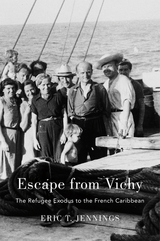
In the early years of World War II, thousands of political refugees traveled from France to Vichy-controlled Martinique in the French Caribbean, en route to what they hoped would be safer shores in North, Central, and South America. While awaiting transfer from the colony, the exiles formed influential ties—with one another and with local black dissidents. Escape from Vichy recounts this flight from the refugees’ perspectives, using novels, unpublished diaries, archives, memoirs, artwork, and other materials to explore the unlikely encounters that fueled an anti-fascist artistic and intellectual movement.
The refugees included Spanish Republicans, anti-Nazi Germans and Austrians, anti-fascist Italians, Jews from across Europe, and others fleeing violence and repression. They were met with hostility by the Vichy government and rejection by the nations where they hoped to settle. Martinique, however, provided a site propitious for creative ferment, where the revolutionary Victor Serge conversed with the anthropologist Claude Lévi-Strauss, and the Surrealist André Breton met Negritude thinkers René Ménil and Aimé and Suzanne Césaire. As Eric T. Jennings shows, these interactions gave rise to a rich current of thought celebrating blackness and rejecting racism.
What began as expulsion became a kind of rescue, cut short by Washington’s fears that wolves might be posing in sheep’s clothing.
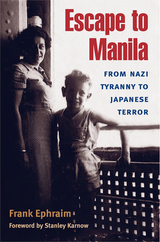
A harrowing account of Jewish refugees in the Philippines
With the rise of Nazism in the 1930s more than a thousand European Jews sought refuge in the Philippines, joining the small Jewish population of Manila. When the Japanese invaded the islands in 1941, the peaceful existence of the barely settled Jews filled with the kinds of uncertainties and oppression they thought they had left behind.
In this book Frank Ephraim, who fled to Manila with his parents, gathers the testimonies of thirty-six refugees, who describe the difficult journey to Manila, the lives they built there upon their arrival, and the events surrounding the Japanese invasion. Combining these accounts with historical and archival records, Manila newspapers, and U.S. government documents, Ephraim constructs a detailed account of this little-known chapter of world history.
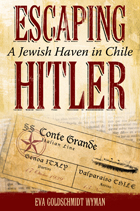
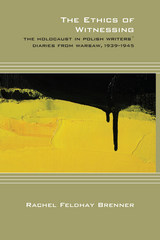
Winner, 2015 USC Book Award in Literary and Cultural Studies, for outstanding monograph published on Russia, Eastern Europe or Eurasia in the fields of literary and cultural studies
The Ethics of Witnessing investigates the reactions of five important Polish diaristswriters—Jaroslaw Iwaszkiewicz, Maria Dabrowska, Aurelia Wylezynska, Zofia Nalkowska, and Stanislaw Rembek—during the period when the Nazis persecuted and murdered Warsaw’s Jewish population. The responses to the Holocaust of these prominent prewar authors extended from insistence on empathic interaction with victims to resentful detachment from Jewish suffering. Whereas some defied the dehumanization of the Jews and endeavored to maintain intersubjective relationships with the victims they attempted to rescue, others selfdeceptively evaded the Jewish plight. The Ethics of Witnessing examines the extent to which ideologies of humanism and nationalism informed the diarists’ perceptions, proposing that the reality of the Final Solution exposed the limits of both orientations and ultimately destroyed the ethical landscape shaped by the Enlightenment tradition, which promised the equality and fellowship of all human beings.
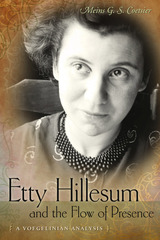
Although she died cruelly at Auschwitz at the age of twenty-nine, Etty Hillesum left a lasting legacy of mystical thought in her letters and diaries. Hillesum was a complex and powerful witness to the openness of the human spirit to the call of God, even under the most harrowing circumstances. Her life was as much shaped by Hitler’s regime as was that of philosopher Eric Voegelin, and as Meins Coetsier reveals, her thought lends itself to interpretation from a uniquely Voegelinian perspective.
Etty Hillesum and the Flow of Presence analyzes the life and writings of Hillesum from the standpoint of Voegelin’s views on consciousness—especially his philosophy of luminous participation in the transcendent ground of being. Through a careful reading of her letters and diaries, Coetsier reveals the inner development of Hillesum’s mystically grounded resistance to Nazism as he guides readers through the symbolism of her spiritual journey, making effective use of Voegelin’s analytics of experience and symbolization to trace her path to spiritual truth.
Intertwining the lives, works, and visions of these two mystical thinkers, Coetsier demonstrates his mastery of both Voegelin’s philosophy and Hillesum’s Dutch-language materials. He shows how mystical attunement to the “flow of presence”—Voegelin’s designation for human responsiveness to the divine—is the key to the development of Hillesum’s life and writings. He displays a special affinity for the suffering and grace-filled transformation that she underwent as she approached the end of her life and gained insight into the ultimate purpose of each individual’s contribution to the well-being and maintenance of the human spirit.
Retrieving one of the lesser-known but most compelling figures of the Holocaust, Etty Hillesum and the Flow of Presence is an original contribution to both Voegelin and Hillesum scholarship that reflects these writers’ strong valuation of the human person. It presents Hillesum’s life and work in an original and provocative context, shedding new light on her experiences and their symbolizations while further broadening the application of Voegelin’s thought
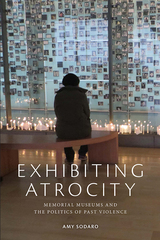
Today, nearly any group or nation with violence in its past has constructed or is planning a memorial museum as a mechanism for confronting past trauma, often together with truth commissions, trials, and/or other symbolic or material reparations. Exhibiting Atrocity documents the emergence of the memorial museum as a new cultural form of commemoration, and analyzes its use in efforts to come to terms with past political violence and to promote democracy and human rights.
Through a global comparative approach, Amy Sodaro uses in-depth case studies of five exemplary memorial museums that commemorate a range of violent pasts and allow for a chronological and global examination of the trend: the U.S. Holocaust Memorial Museum in Washington, DC; the House of Terror in Budapest, Hungary; the Kigali Genocide Memorial Centre in Rwanda; the Museum of Memory and Human Rights in Santiago, Chile; and the National September 11 Memorial Museum in New York. Together, these case studies illustrate the historical emergence and global spread of the memorial museum and show how this new cultural form of commemoration is intended to be used in contemporary societies around the world.
Download open access ebook.
READERS
Browse our collection.
PUBLISHERS
See BiblioVault's publisher services.
STUDENT SERVICES
Files for college accessibility offices.
UChicago Accessibility Resources
home | accessibility | search | about | contact us
BiblioVault ® 2001 - 2024
The University of Chicago Press









